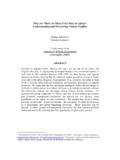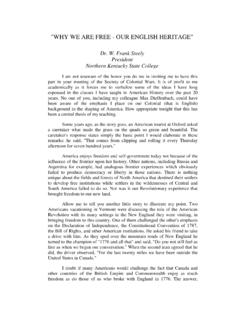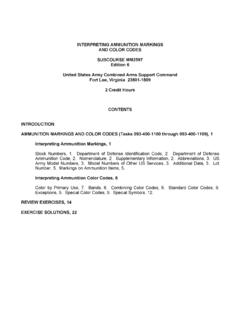Transcription of The Windrush Generation - bristolreads.com
1 20/21 There has been a black presence in Britain for thousands of people originally came to the country as merchant seamen,servants, slaves, stokers, labourers, artists, students and entertainers,and as sailors, soldiers and airmen during the two World Wars. Manystayed on and black communities developed in isolated pockets incities such as Cardiff, Liverpool and London during the late nineteenthand early twentieth 1948 Nationality Act marked thebeginning of a new era in black immigrationas it stated that every Commonwealth citizen was also a British subject and,therefore, guaranteed the right of entry to the United Kingdom. An open door immigration policy remained until 1962 when the Commonwealth Immigrants Actintroduced a quota system and restrictedadmission to those holding employmentvouchers. During the early post-war period,the number of immigrants arriving from theCaribbean each year was in the lowhundreds and this did not increasesignificantly until the mid-1950s when theMcCarren-Walter Act limited immigration tothe USA, the preferred destination for many.
2 In June 1948 the British troopship ss EmpireWindrusharrived at Tilbury Docks in Kentcarrying 492 civilian passengers fromJamaica, including Andrea Levy s of these Jamaicans were young menwho had served with the Allied Forces inEurope during the war and were keen toreturn, having had a glimpse of theopportunities Britain could offer. Few expected to remain in Britain for longerthan five years, but in the event most stayedon and settled here and were later joined bytheir wives and families. In Small Island,Hortense joins Gilbert a few months after his arrival, expecting him to have sorted outsuitable accommodation that will be inkeeping with her lofty expectations of theBritish way of life. She is shocked by thesqualor of the attic room he is renting inQueenie s house, failing to appreciate thatthis is the best he is able to provide indifficult circumstances. In his frustrationGilbert tells her:This room is where you will sleep, eat, cook,dress, and write your mummy to tell her howthe Mother Country is so fine.
3 And, littleMiss High-class, one thing about Englandyou don t know yet because you just comeoff a boat. You are Mike Phillips has written that theearly migrants mood veered between regretand expectation, but largely, attitudes werehopeful and optimistic . Phillips continues:The Windrush Generation Waiting to disembark at Tilbury Docks, 1948 (Science and Society/NMPFT Daily Herald Archive).A Musical Club, 1808, artist unknown( The Royal Institution of Cornwall:PEemi001). The black musician depictedhere is thought to be the composerJoseph Emidy who lived in Falmouthand was a former slave. He was born inGuinea, West Africa in 1775. He died in1835 and is buried in any interest in finding out about unquestioningly answered the call todefend her, he describes his shock at firstseeing the shabbiness of the Mother Country:The filthy tramp that eventually greets you isshe. Ragged, old and dusty as the long has a blackened eye, bad breath andone lone tooth that waves in her head whenshe speaks.
4 Can this be that fabled relationyou heard so much of? This twisted-crookedweary woman. This stinking cantankeroushag. She offers you no comfort after yourjourney. No smile. No welcome. Yet shelooks down at you through lordly eyes and says, Who the bloody hell are you? He is also soon to learn on his return in 1948that his RAF uniform and the wartime spirithad previously shielded him from the worstexcesses of British racism. Yet despite thebleakness of the present situation, he isunable to leave as there is nothing to goback to, even if he could afford the fare. He remembers too well the disappointmentof returning to Jamaica after the war: .. instead of being joyous at this demob Ilooked around me quizzical as a jilted , that was it. Now what? With alarm Ibecame aware that the island of Jamaicawas no universe: it ran only a few milesbefore it fell into the sea. In that moment,standing tall on Kingston harbour, I wasshocked by the awful realisation that, man,we Jamaicans are all small islanders too!
5 (Left) The arrival of the Windrushat Tilbury Docks,Essex, 22 June 1948 (Science and Society/NMPFTD aily Herald Archive).(Right) Young Jamaican boy looking after hisfamily s luggage, September 1954 (Science andSociety/NMPFT Daily Herald Archive).Caribbean migration to Britain was simplythe logical conclusion of Caribbean historyand Caribbean life up to the midpoint of the 20th century. The historical, economic,social, cultural and linguistic relationshipwith Britain had created and shaped theregion. The hopeless economic conditions of the islands pushed its people outwardsrather than holding them in place, and for agroup of nations, which had been called intoexistence by Britain, migration to Britainwas, in a sense, like coming home. Small Island s Gilbert had alreadyexperienced British life during the war andwas aware that the Mother Country was notthe paradise the people in the colonies hadbeen led to believe. The food was bland, theskies grey, the people dreary, he was staredat in the street and called abusive names,and although he had been taught everythingthere was to know about Britain in school, noone here even knew where Jamaica was or









